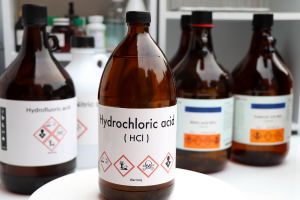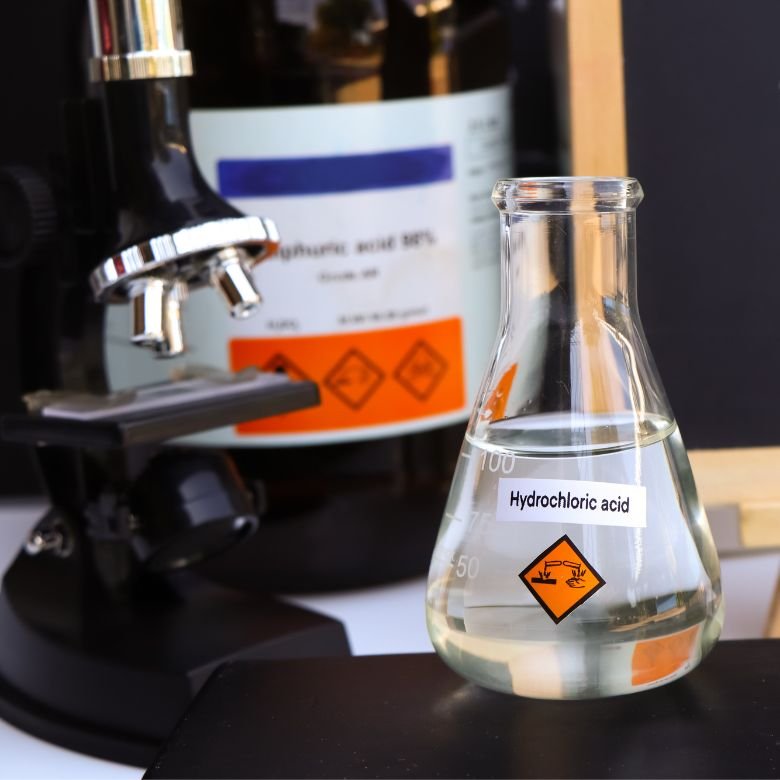Hydrochloric acid (HCl) belongs to the group of strong inorganic acids with a wide range of applications. Due to its range of specialised properties, it plays a key role in many industries, where it is used for a variety of processes. In this article, we take a closer look at the uses of hydrochloric acid and why it is so popular.

Flawless steel: how hydrochloric acid makes metals easier to work with
Hydrochloric acid is one of the essential chemicals in the metallurgical industry. Among its main applications is metal etching. This is the process of removing oxides and other impurities from the surface of the metal. Etching is used, among other things, to improve the adhesion of paint coatings, but also to clean scrap metals to facilitate their subsequent recycling. Hydrogen chloride is particularly effective for etching brass, steel, copper, zinc, aluminium and others. It is also used for the digestion of pig iron, before it is turned into steel. This improves the quality of the steel produced.
Hydrogen chloride is also used to prepare surfaces before galvanisation, to clean metal surfaces – e.g. to remove rust, or to regenerate ion-exchange resins.
Hydrochloric acid is readily used in the metallurgical industry for its properties, but also for its easy availability and low cost.
Hydrochloric acid – an essential ingredient in many medicines
Although pharmacy is usually not the first thing that comes to mind when talking about hydrochloric acid applications, it appears that the compound plays a key role in the production of many drugs. So where is it used?
HCl is a key reagent involved in the synthesis of many active substances, including ascorbic acid (vitamin C), p-aminobenzoic acid (PABA), but also antihistamines and some antibiotics. Hydrochloric acid can also be an essential ingredient in the production of other intermediate chemicals that are used to synthesise drugs.
In the drug production process, hydrogen chloride can also act as a pH regulator. It works well, for example, during fermentation or crystallisation stages, where it is necessary to maintain a strictly defined pH. It can also be an additive to finished medicines, affecting their pH stability.
Pharmacy also makes excellent use of the cleansing and disinfecting properties of hydrochloric acid. Among other things, it is used in the purification of raw materials to remove contamination as well as heavy metals that could adversely affect the quality and safety of medicines. Hydrochloric acid also works well as a cleaning and disinfecting substance for some laboratory and production equipment.
See the range of pharmaceutical raw materials from the PCC Group.
Ensuring clean water: hydrochloric acid in water treatment
One important use of hydrochloric acid is to use it to decarbonise water. This is a water treatment process in which carbonate hardness (a measure of water hardness that tells us about the presence of carbonate anions CO3 and bicarbonate anions HCO3) is reduced. During decarbonisation, acidic calcium and magnesium bicarbonates are removed, which can cause problems such as:
- formation of limescale, which tends to be deposited on heating elements and in water supply systems,
- change in the smell and taste of water – water rich in bicarbonates has a metallic smell and an unpleasant, bitter taste.
Why is hydrochloric acid specifically used in this process? When added to water, in the right quantity and at the right concentration, it can effectively lower its pH, leading to the decomposition of acidic bicarbonates and their precipitation in the form of calcium carbonate deposits, as well as magnesium carbonate, which will be easy to remove.

Hydrochloric acid – versatility at the service of industry
The use of hydrochloric acid in the metallurgical industry, the pharmaceutical industry or in water treatment are just some of the possibilities. The substance also plays an important role in many other industries, such as:
- Chemical industry – among other things, it is a key raw material for the synthesis of many chemicals, is used in the production of dyes, or the refining of precious metals.
- Food industry – as a pH regulator, hydrochloric acid can be found, for example, in marinades, sauces, preserves or canned food. It is also an essential ingredient for the gelatine production process, as it is responsible for the hydrolysis of collagen.
- Textile industry – hydrochloric acid is used to synthesise polymers, which are then used to produce artificial fibres (e.g. nylon). It can also be used to modify the properties of certain fabrics.
- Leather industry – is used in the process of tanning leather, i.e. making it flexible and durable.
We therefore learned that hydrochloric acid has a wide variety of properties that allow a whole range of applications in many industries. We can find it in the composition of essential products, but it is also as a key component of specific processes. Because of the important roles that hydrochloric acid can play, it is worth remembering to choose a reliable supplier who will ensure the high quality, correct concentration or expected purity of the product. One manufacturer that offers hydrochloric acid is the PCC Group. The available hydrochloric acid products can be found on the Product Portal, where their detailed characteristics and application possibilities are described. We encourage you to check out the range!
- https://www.chemicalsafetyfacts.org/chemicals/hydrochloric-acid/
- https://www.naukowiec.org/wiedza/chemia/chlorowodor_1029.html
- https://www.chemsrc.com/en/cas/7647-01-0_81412.html